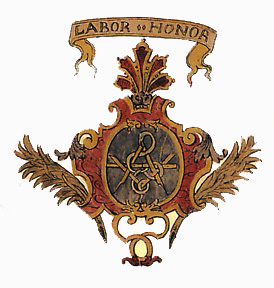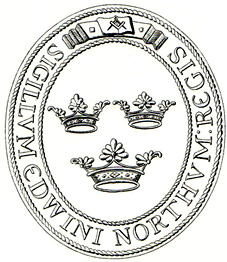
Freemasonry and Its Landmarks
The Rough Ashlar
August 1892 and June 1893
Why has Freemasonry existed so long as it has?I claim its existence is due to the fact that it is NOT a secret society.
'Tis true, we have modes of recognition, rites and ceremonies, and secrets with which the profane are not acquainted, nor can its beauties be appreciated without a thorough knowledge of its mystic language, composed as it is of gems of philosophy linked with beautiful symbols, and its charity falls as noiselessly as the dews of heaven ; yet, strictly speaking, it is not a secret society.A secret society is one of those gatherings where men meet to discuss things in strict confidence, without giving to the world any knowledge of its mission. Men are condemned to die, plots and conspiracies are entered into, anarchy holds full sway, and deeds that are dark, foul, and damnable are accomplished. The world is not permitted to know of whom it is composed, its place of meeting is a profound secret, and all connected with it are schemers, plotters, atheists, and anarchists, who have the stamp of perdition on their souls.
To illustrate my position, I point you to the famous Clan-na-Gael, to the dread Mafia, and others of the same stamp. Their history is too well known for comment. They are secret societies that breed death and destruction. Their own members, to divulge their dark deeds meet with instant death. Now, if Masonry is paraded as a SECRET SOCIETY its days are numbered. But from this we have nothing to fear. Now, if it is not a secret society what is it? It is a private society, formed on the broad basis of brotherly love, relief, and truth. No free man with the essential physical qualifications is denied admission if he be "good and true." Its constitutions are for the world to behold. The ancient charges and regulations are open for inspection. Its tenets, its cardinal virtues, add lustre to its brilliancy. Its laws and jurisprudence are published to the world. These things are not secret. No man, however great his prejudice, will deny the fact that it has a good effect on the human race. It has existed while other things of human invention have died. It exists today because it inculcates every virtue. It has survived the bulls against it from Rome-the persecution of kings and emperors.There must be a cause for this. While Masonry does not offer the pass to heaven, yet its banner is painted in gilded letters of faith in God and hope in immortality. This, to my mind, is the key to the situation. Its teachings have always been so pure that its votaries have guarded it with loving fidelity. It cannot die, because it is built on a firm foundation-has principles underlying it that will endure "till time shall be no more." No human institution has ever had such vile indignities heaped upon it. The popes insist the Masonic Society admits the believer and atheist on a common platform. They claim that it is and has been engaged in warfare against the church and the governments of the earth. What silly expressions! Had they acquainted themselves with its lectures, with its symbolism; had they investigated before passing sentence, they might have been honoured by joining this grand procession of the world's greatest men; in marching on to the summit and perfection of our aim -TRUTH.
Freemasonry has existed because it teaches the moral law. The man who takes the name of God in vain is guilty of a Masonic offence. It exists because it has never stooped to the intrigues of politicians. It exists because it has a universal language found in no other Society. It exists because it is a science based on the philosophy of that religion in which all men agree-that of the existence of a SUPREME RULER and the immortality of the soul. When kingdoms and republics have fallen, when wars have been fought between nations, it will exist on the side of conqueror and conquered alike.Its Landmarks are indestructible.
Freemasonry has been established for generations.It has maintained its peculiar characteristics.
It has never changed.
Its principles have been maintained.
Its esoteric teachings are unaltered.
Its ceremonial has been conserved.
Its traditions are given as in the aforetime.Its Landmarks are indestructible. The devotion of its associates now is as earnest, sincere, and impregnable as at the beginning.
The history it has made is unassailed.
The foundations on which it rests are eternal. These facts will hardly be denied, even among the incredulous profane. Faith in them is the heritage of the true Mason.
What other human institution can make these claims on the intelligent, thinking student of the records time has written on "now" as it becomes "was"?
There must, therefore, be in Freemasonry some special vitality, some indefinable spirit or essence, some superhuman inherent faculty that has operated to secure such results. Through the ages Freemasonry has lived and maintained its character. When the rise and fall of empires, the revolutions in thought, opinions, and forms of government had worked out changes among mankind ; when the iconoclasts had broken images, the laws, social order, overthrown many institutions, made martyrs and victims, and immolated many of their devoted adherents, yet Freemasonry lived. Strong, persistent, reliant, filled with faith, and ready for perils, the Craft never faltered in the performance of its duties.In caves, on the mountain tops, the Craft met and obeyed the teachings they had received. Thus did the brethren conduct their ceremonies.
They were animated by the spirit of a devotion to their association that seemed to partake of a solemn recognition as a revelation. Their social relations, their identification with the people of the country, their responsibilities as units in the communital organizations of which they were part, while rendering them amenable to the profane laws, in no wise weakened the ties or bonds that bound them to the Fraternity of the Craft. They were ever, always, Freemasons.Obeying the civil magistrate, engaged in no conspiracy against government, they believed in God and trusted to His care.These Freemasons were often only a few persons. It may be said, in one sense, their strength came out of their weakness. But, no. It was the strength that the history of the past of the Craft made irresistibly potent. It was a faith that had marked the concurrent evidences of the indestructible organization which came to them from the fathers. The quiet, pervading courage of the Craftsmen would not desert the Lodge. The principles which were the cementing power of the foundations of Freemasonry were the refuge and defence of the brethren.
The teachings of the Lodge inspired them. Duty was never to be ignored. The "Great Light" was a lamp to their feet. From it they were never. to depart. As long as they adhered to an obedience without question, they felt safe and secure.This, brethren, is your heritage. Your obligations to it command your strict adherence to the principles and teachings which indelibly mark and make manifest what to say is, as in the generations that have passed, true Freemasonry. This is our heritage. It is worthy of our earnest, sincere, abiding devotion. Let nothing separate us from our courageous adherence to every principle which has made our inheritance so glorious.
